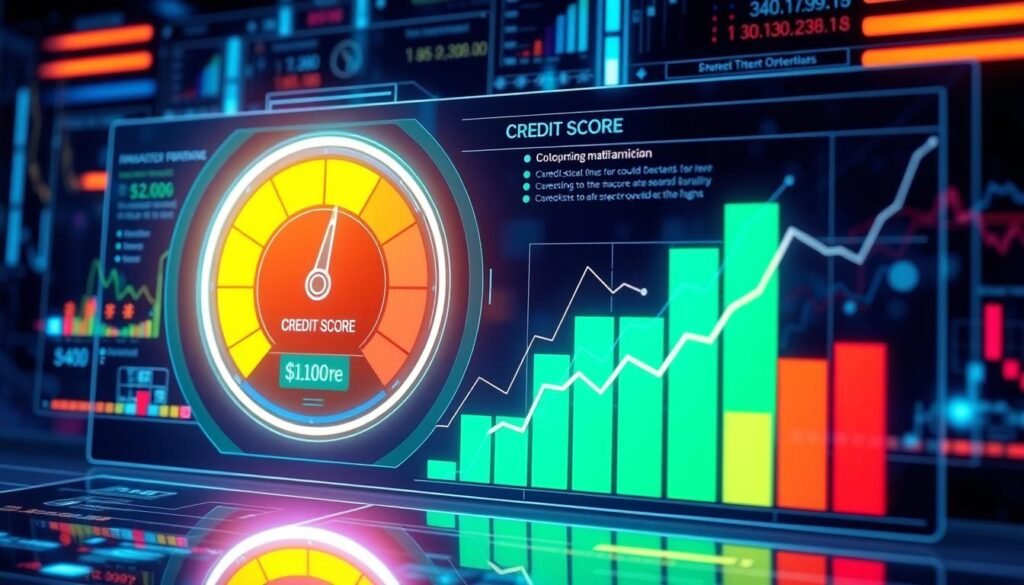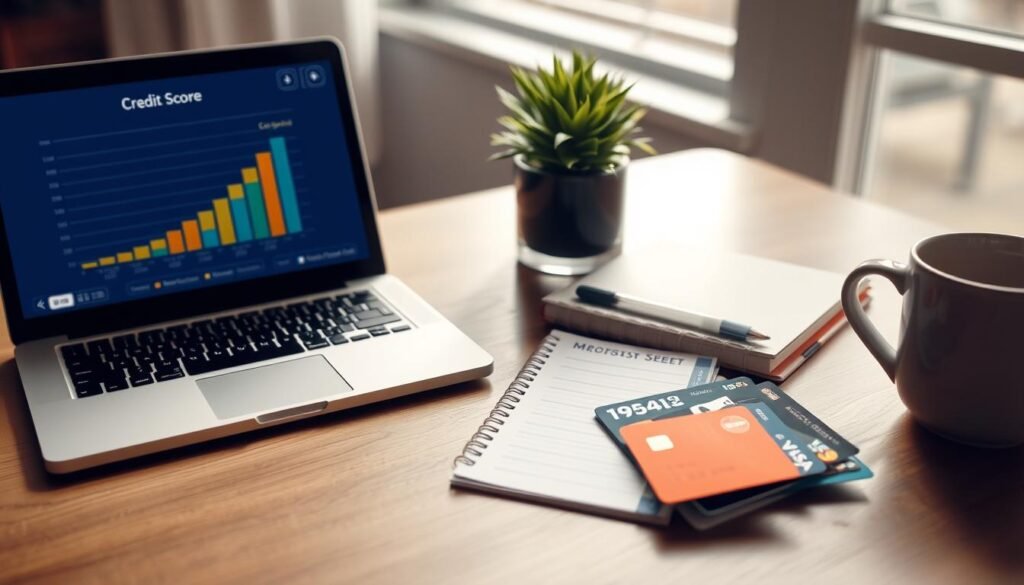Have you ever been turned down for a credit card or loan? You’re not the only one. This is a common experience, leaving many feeling helpless. Secured credit cards can be a game-changer for you, offering a way to better your financial standing.
Getting a new secured card feels like a fresh start. My journey had its tough moments before I found the right tools. Secured credit cards are key for those wanting to rebuild credit. They offer a chance for improvement and success if used wisely.
Secured credit cards can be a step towards fixing your credit. They’re great because they report to major bureaus, helping rebuild your score. Just thinking about the relief of moving towards financial freedom with each payment is motivating.
Check out This resource for a detailed look at secured credit options. It provides valuable advice to guide your choice. It’s like having a coach as you rewrite your financial story with secured credit cards.
Table of Contents
ToggleKey Takeaways
- Secured credit cards require a cash deposit that sets your credit limit.
- Ideal for individuals with bad or limited credit history.
- Timely payments and low credit utilization can significantly improve your credit score.
- Cards like Discover it® Secured and Capital One Platinum Secured have favorable terms.
- Choosing the right card involves comparing interest rates, fees, and benefits.
Understanding Secured Credit Cards
Secured credit cards are a lot like regular ones but need a security deposit upfront. This deposit is usually the same as your credit limit. So, if you put down $300, you get a $300 limit. This deposit is there to protect the card company, making these cards great for people with bad credit or no credit at all.
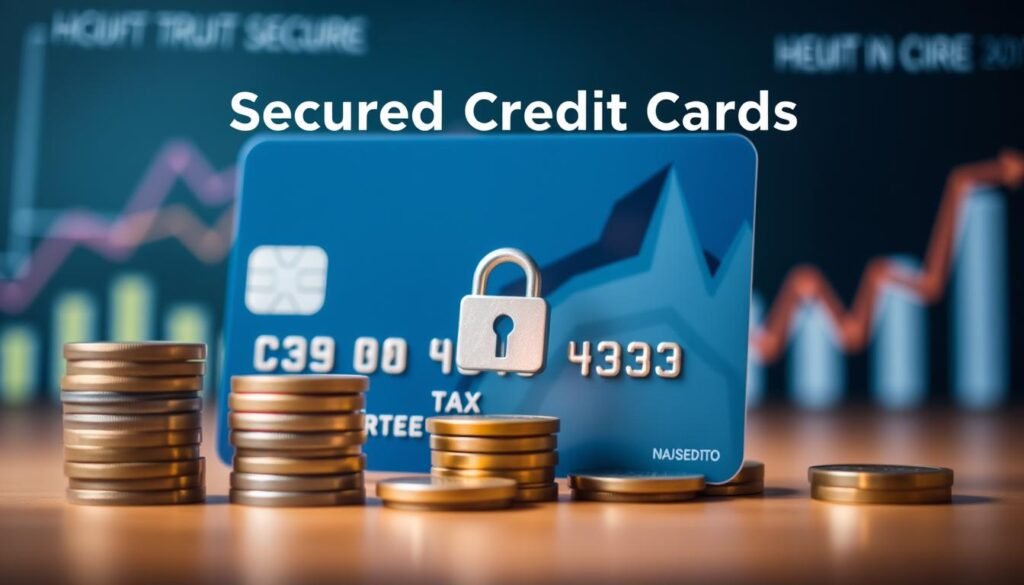
The key thing about how secured credit cards work is the security deposit. These cards, unlike their unsecured cousins that don’t need a deposit, are easier to get. They help rebuild credit because they report how you pay to Equifax, TransUnion, and Experian, which affects 35% of your score.
Knowing the differences between secured vs. unsecured credit cards is important. Secured cards need a deposit, have lower limits, and higher fees but are easier to get. Unsecured cards, however, have higher limits and perks but are tougher to get, especially if your credit isn’t great.
Secured credit cards are great for fixing your credit. Just spend smartly—no more than 30% of your limit—and always pay on time. You could see your score go up in as little as six months. Some issuers might even upgrade you to an unsecured card after a while of good credit habits.
But beware of the high fees secured credit cards can have. They might charge for applying, processing, and yearly fees, between $25 and $49. Also, their interest rates can be really high, sometimes over 20% APR. Still, they’re valuable for building or repairing credit because of how accessible they are and the chance to move up to unsecured cards later.
For a clearer perspective, review the differences between secured and unsecured credit cards:
| Feature | Secured Credit Cards | Unsecured Credit Cards |
|---|---|---|
| Approval Requirements | Less Strict | More Strict |
| Security Deposit | Required | Not Required |
| Credit Limit | Equals Deposit | Higher Limits |
| Credit Utilization | Recommended 30% or Less | Recommended 30% or Less |
| Reporting to Bureaus | Usually to All Three | Usually to All Three |
| Interest Rates | High, Often Above 20% APR | Varies Widely |
| Transition to Unsecured | Possible with Positive History | Not Applicable |
In conclusion, getting to know how secured credit cards work, along with their pros and cons, will help you make smart choices. These cards can really help rebuild credit if used wisely.
How Secured Credit Cards Help Build Credit
Secured credit cards are great for starting or fixing your credit history. They help you understand the basics of credit and encourage responsible habits. With careful use, you can greatly improve your credit score.
Reporting to Credit Bureaus
Credit bureau reporting is a huge benefit of secured credit cards. They report to Experian, TransUnion, and Equifax. This happens over 90% of the time. By making payments on time, you start to build a strong credit history.
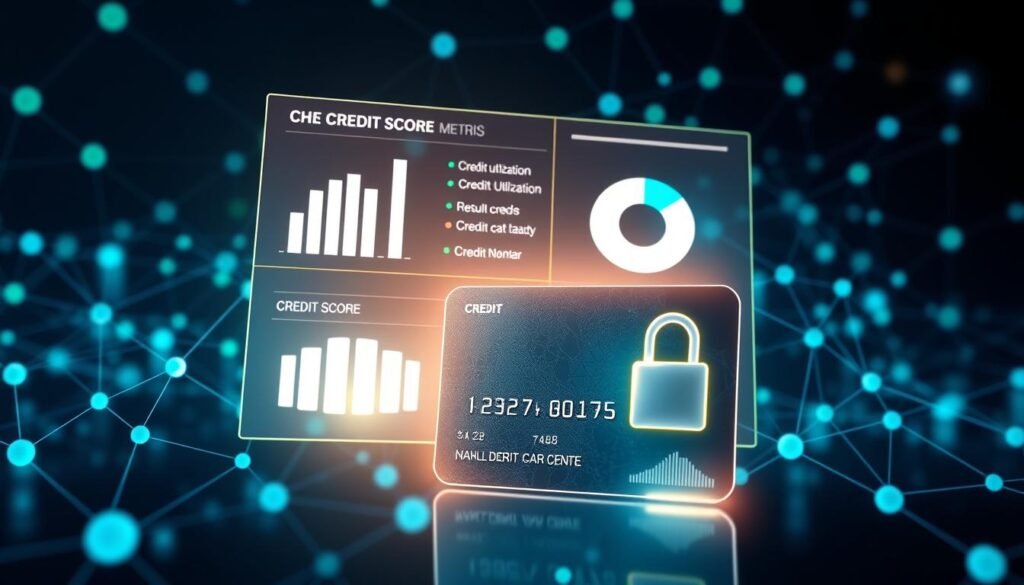
Using your card wisely is key. Try to keep your balance below 30% of your credit limit. Also, check your credit regularly. You can get free annual reports from the three bureaus to track how you’re doing.
Responsible Usage
Being careful with secured credit cards for beginners is crucial. Here’s what you should do:
- Keep balances low, under 30% of your credit limit. This helps your credit score stay healthy.
- Always make your payments on time. This affects about 35% of your credit score.
- Automatic payments can be a good idea to avoid missing due dates.
Late or missed payments can really hurt your score, sometimes by more than 100 points. If you use your secured card right, your credit score can get better. This makes it easier to get unsecured cards later.
“Improving your credit score with secured cards works well if you’re responsible”
| Aspect | Importance |
|---|---|
| On-time Payments | 35% of credit score calculation |
| Credit Utilization | 30% of credit score calculation |
| Credit Bureau Reporting | Essential for building credit |
| Automatic Payments | Helps ensure timely payments |
Best Secured Credit Cards for Credit Building
Looking for the top secured credit cards to build credit? Many cards offer great terms and benefits. They can really help improve your credit score.
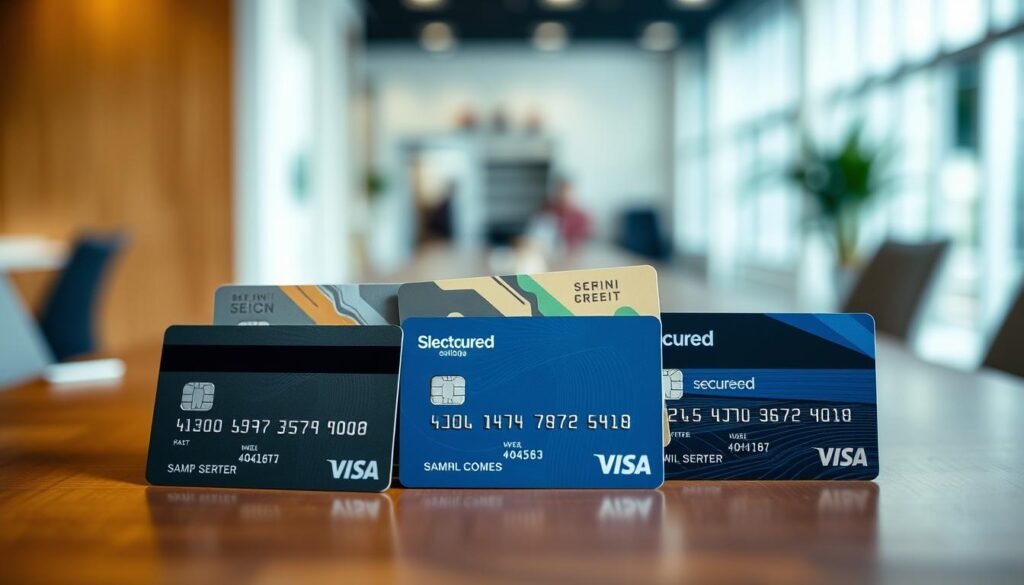
The Capital One Quicksilver Secured Cash Rewards Credit Card is impressive. It gives 5% unlimited cash back on hotels and rental cars. These must be booked through Capital One Travel. You also get 1.5% cash back on all other purchases. The card’s purchase APR is 29.74% variable. A security deposit starts at $49 for a $200 credit line. This is very competitive for secured credit cards.
The Discover it Secured card is another great choice. It offers 2% cash back at gas stations and restaurants. This is up to $1,000 in combined purchases quarterly. Plus, you get 1% on all other purchases. Its purchase APR is 28.24% variable. This card helps build credit and rewards you too. After seven months, Discover starts checking your account monthly. They do this to see if you can move to an unsecured card.
Want rewards flexibility? The Bank of America Customized Cash Rewards Secured credit card is good for you. Earn 3% cash back in a category you choose. Get 2% at grocery stores and wholesale clubs. This is up to $2,500 in combined purchases per quarter, and 1% on everything else. With a 18.00% variable purchase APR, it saves interest costs over time.
The Navy Federal nRewards Secured card is flexible about deposits. It lets you choose from $200 to $5,000. It gives rewards, like 1x points per dollar spent. The U.S. Bank Altitude Go Secured card also requires a deposit between $300 and $5,000. It earns 4x points on dining, including takeout and delivery. You get extra points for gas and groceries.
The Chime Secured Credit Builder Card keeps things simple. With no minimum security deposit or annual fee, it’s easy to manage. This card doesn’t charge interest and reports to all three major credit bureaus. It’s a straightforward option among the top secured credit cards.
Click here to explore secured credit cards. Find the one that fits your credit-building needs best.
| Card | Annual Fee | Purchase APR | Rewards |
|---|---|---|---|
| Capital One Quicksilver Secured | $0 | 29.74% variable | 5% cash back on Capital One Travel; 1.5% cash back on all purchases |
| Discover it Secured | $0 | 28.24% variable | 2% cash back at gas stations and restaurants; 1% on all other purchases |
| Bank of America Customized Cash Rewards Secured | $0 | 18.00% variable | 3% in category of choice; 2% at grocery stores/wholesale clubs; 1% on all purchases |
| Navy Federal nRewards Secured | $0 | Variable | 1x points per dollar spent |
| U.S. Bank Altitude Go Secured | $0 | Variable | 4x points on dining; 2x points on gas, groceries, and streaming services |
| Chime Secured Credit Builder Card | $0 | N/A | None |
How to Choose a Secured Credit Card
When picking the right secured credit card, it’s key to understand what these cards offer. You must compare things like fees, how much you need to deposit, and if you can switch to a standard card later. Finding a card that helps rebuild your credit, while also matching your financial plans, is important. Let’s look into what you should think about when choosing secured credit cards.
Secured credit cards often have high fees and interest rates. For example, the Capital One Platinum Secured Credit Card has a 29.74% variable APR and no annual fee. Meanwhile, the First Progress Platinum Prestige Mastercard® Secured Credit Card has a 14.24% variable APR but charges a $49 annual fee.
Deposit amounts for these cards usually start between $200 to $500. The Discover it® Secured Credit Card requires at least $200 for a deposit, which then sets your credit limit. Some cards, like the Capital One option, might ask for up to $500.
Make sure the secured card you pick reports to the big three credit bureaus: Equifax, Experian, and TransUnion. This step is crucial for rebuilding your credit. Most secured cards, including the Discover it® Secured Credit Card, report your payment activity to these bureaus regularly.
Look for cards that might allow you to increase your credit limit without an added deposit. This can help improve your credit use rate. Capital One, for example, might review your account now and then to offer a higher limit.
Many secured cards offer a way to move on to standard cards later. With responsible use, you could get a regular credit card with better terms and no deposit needed. Cards like the Discover it® Secured Credit Card may review your account after eight months to consider switching you to a better card.
Below is a side-by-side look at some well-known secured credit cards to help you decide:
| Card | Cardholder Rating | Bankrate Score | Regular APR | Annual Fee | Notable Features |
|---|---|---|---|---|---|
| Secured Self Visa® Credit Card | 4.2 | 3.1 | 28.49% Variable | $25 | None |
| Capital One Platinum Secured Credit Card | 4.3 | 4.1 | 29.74% Variable | $0 | Minimum deposit of $500 |
| Chime Credit Builder Secured Visa® Credit Card | 4.6 | 4.2 | N/A | None | No annual fee |
| Discover it® Secured Credit Card | 4.5 | 4.5 | 27.24% Variable | $0 | No foreign transaction fees, cash back rewards |
| First Progress Platinum Prestige Mastercard® Secured Credit Card | 4.1 | 2.6 | 14.24% Variable | $49 | Lower interest rates |
| OpenSky® Secured Visa® Credit Card | 3.8 | 3.1 | 24.89% Variable | $35 | No credit check |
| Capital One Quicksilver Secured Cash Rewards Credit Card | 4.6 | 4.0 | 29.74% Variable | $0 | Cash rewards |
Reviewing secured credit card features carefully can help you make a smart choice. Remember, choosing wisely is your first step toward improving your credit score.
Benefits of Secured Credit Cards
Secured credit cards offer many benefits for people working on their credit history. They are easy to get, even if you have bad advantages of secured credit cards or no credit at all. Usually, you need to put down a deposit between $200 and $500, which becomes your credit limit.
Another perk is that these cards report to all three main credit bureaus—Equifax, Experian, and TransUnion. This is key for secured cards for credit improvement because it means your good credit habits help boost your score. It’s best to keep your spending under 30% of your credit limit to raise your score.
Secured credit cards help teach you to spend wisely. Since your spending limit is the same as your deposit, it’s easier to keep track of your money. This teaches you to use credit cards correctly and helps you move on to regular credit cards.
Below is a table summarizing some common benefits and statistics associated with secured credit cards:
| Benefit | Description | Typical Range/Statistic |
|---|---|---|
| Credit Reporting | Reports to all three credit bureaus | Nearly all secured cards |
| Credit Limit | Equals the cash deposit | $200 – $500 |
| Interest Rate | Common rate for secured cards | Over 20% |
| Balance Management | Recommended utilization rate | 30% or less |
| Score Improvement | Potential credit score increase with responsible use | 20-30 points within a few months |
Using secured credit cards wisely opens up great financial opportunities with secured cards. Many find their credit scores improve after just six months of on-time payments. Thus, secured credit cards are a great first step to better financial health and access to better credit deals.
Tips for Using a Secured Credit Card Effectively
Using a secured credit card wisely is a big step in building credit. Below are key strategies for making the most of your secured card. These can lead to better credit scores and the chance to get unsecured cards.
Keeping Your Balance Low
It’s crucial to keep a low balance on secured credit cards. Experts advise keeping your credit use under 30%. For example, if you have a $500 limit, try not to spend more than $150.
Careful use of your secured credit card shows lenders you’re responsible. Keeping a low balance proves you’re not too dependent on credit.
Following this rule can improve your scores and make lenders trust you more. This might lead to higher limits or getting an unsecured card.
Making Timely Payments
Making payments on time is essential for credit improvement strategies. Your payment history has a big impact on your credit score. Some people have even raised their scores by 50 points by paying on time.
- Try to avoid late payments to protect your credit score.
- Setting up reminders helps you to never miss a payment.
Secured cards like the Discover it® Secured Credit Card tell the credit bureaus about your payments. Each payment made on time helps build a good credit history.
By using these tips for managing a secured card, you can boost your credit. This opens the door to a brighter financial future.
Comparing Secured Credit Card Options
When you compare secured credit cards, consider key factors. This will help you find the best card for your money needs.
Interest Rates and Fees
Interest rates and fees are key in choosing secured credit cards. The Citi® Secured Mastercard® has a 27.74% APR, higher than some. In contrast, the DCU Visa® Platinum Secured Credit Card offers a 16.75% APR.
The U.S. Bank Cash+® Visa® Secured Card has a 29.49% APR. Yet, it gives 5% cash back on some buys. Always look for low fees as they add up over time.
Deposit Requirements
Deposit needs differ with secured credit cards. The Platinum Secured Mastercard® requires at least a $500 deposit. Meanwhile, the Citi® Secured Mastercard® needs a $200 minimum deposit.
This means you should pick a card fitting your budget. Cards like the Capital One Platinum Secured Credit Card can offer more credit after consistent payments.
Rewards and Perks
Secured cards often have fewer perks than unsecured ones. But, there are still enticing options. For example, the Discover it® Secured Credit Card gives 2% cash back at gas stations and eating places, up to $1,000 each quarter, and 1% on everything else.
The U.S. Bank Cash+® Visa® Secured Card has great perks too. It offers 5% cash back on up to $2,000 spent in select categories each first quarter, and 2% on everyday categories.
Conclusion
Getting a secured credit card is a smart move for building or fixing your credit score. You start with a cash deposit that matches your credit limit. This makes secured cards a safe choice for people with low or no credit history. It encourages you to spend wisely and manage your credit well, improving your financial situation over time.
Moving from a secured to an unsecured card is a big plus. This can happen after making on-time payments for 9 to 12 months. Cards like the Discover it Secured Credit Card and the BankAmericard Secured Credit Card let you make this switch. They show why it’s key to manage your credit well. Plus, they report to major credit bureaus—TransUnion, Equifax, and Experian. This helps you build a good credit history.
Understanding the terms and conditions is vital for success with secured credit cards. Some cards have fees and offer fewer rewards than regular credit cards. But if you compare them carefully, you can find options with no extra charges. A great example is the Armed Forces Bank’s Credit Builder Secured Visa® Credit Card. Making informed decisions and using your card wisely helps improve your credit. This opens the door to better credit options in the future.
FAQ
What are the best secured credit cards for credit building?
The top secured credit cards for credit building are Discover it® Secured and Capital One® Secured Mastercard®. The Citi® Secured Mastercard® is also great. These cards have low fees and report to credit bureaus. They are perfect for improving your credit history.
How do secured credit cards work?
Secured credit cards need a refundable deposit to set a credit limit. This deposit acts as a safety for the issuer. Using these cards wisely and paying on time boosts your credit score.
What’s the difference between secured and unsecured credit cards?
Secured credit cards need a deposit as security, while unsecured ones don’t. Secured cards are easier to get for people with poor or no credit history. Unsecured cards, though, usually offer higher limits and more rewards. They need a good credit score.
How do secured credit cards help build credit?
These cards build credit by reporting how you pay to major credit bureaus like Experian, TransUnion, and Equifax. Paying on time and keeping your credit use low will help raise your credit score.
What are the benefits of using secured credit cards?
Secured credit cards let you build or fix your credit score. They have manageable limits and are easy to get. Using them right can lead to better terms on loans and future credit cards.
How can I choose the best secured credit card for my needs?
Choosing the best secured credit card depends on several things. Look at fees, deposit needs, and if it can change to an unsecured card. Pick cards that report to all credit bureaus and might offer benefits.
What should I keep in mind to use a secured credit card effectively?
To use a secured credit card well, keep what you owe low compared to your limit. Always make payments on time. These actions boost your credit score and show you’re a reliable borrower.
What fees and interest rates should I expect with secured credit cards?
Expect to see annual fees, monthly charges, or high interest rates with secured credit cards. Comparing these among cards helps you find affordable options with good terms.
What are the typical deposit requirements for secured credit cards?
Deposits for secured credit cards usually go from 0 to 0. Some cards might ask for more or less. Make sure the deposit is affordable for you.
Do any secured credit cards offer rewards or perks?
Though not common, some secured cards offer perks like cash back. For example, Discover it® Secured matches the cash back you earn in the first year. This can add extra value to the card.
Source Links
- Best Secured Credit Cards to Build Credit in January 2025 | Bankrate – https://www.bankrate.com/credit-cards/building-credit/best-secured-cards/
- Discover Secured Credit Card | Build Your Credit History – https://www.discover.com/credit-cards/secured-credit-card/
- Best Secured Credit Cards of 2025 – Experian – https://www.experian.com/credit-cards/best-secured/
- What Is a Secured Credit Card & Does It Build Credit? | Equifax – https://www.equifax.com/personal/education/credit-cards/articles/-/learn/what-is-a-secured-credit-card-do-they-build-credit/
- How To Build Credit With A Secured Credit Card | Bankrate – https://www.bankrate.com/personal-finance/credit/build-credit-with-secured-credit-card/
- How to Build Credit With a Secured Credit Card – NerdWallet – https://www.nerdwallet.com/article/credit-cards/build-credit-with-secured-credit-card
- How You Can Build Credit With a Secured Credit Card | Capital One – https://www.capitalone.com/learn-grow/money-management/how-to-help-build-credit-with-secured-credit-card/
- Best secured credit cards for 2025 – https://finance.yahoo.com/personal-finance/credit-cards/article/best-secured-credit-cards-171300343.html
- Best Secured Credit Cards of January 2025 – NerdWallet – https://www.nerdwallet.com/best/credit-cards/secured
- 5 Best Secured Credit Cards to Build Credit (2025) – WalletHub – https://wallethub.com/credit-cards/secured/
- Establishing Credit with Secured Credit Cards | Chase – https://www.chase.com/personal/credit-cards/education/build-credit/how-to-establish-credit-with-secured-credit-card
- Best secured credit cards of January 2025 – https://www.cnbc.com/select/best-secured-cards/
- Secured Credit Cards: What They Are & How They Help Build Credit – https://www.debt.org/credit/cards/secured/
- The Benefits of Secured Credit Cards | Blog – https://www.academybank.com/article/what-are-the-benefits-of-secured-credit-cards
- 5 Benefits of a Secured Credit Card – https://www.mtb.com/library/article/5-benefits-of-a-secured-credit-card
- Cardholders who used secured credit cards to rebuild credit | Bankrate – https://www.bankrate.com/credit-cards/building-credit/how-to-use-secured-credit-card-to-rebuild-credit/
- How to Use a Secured Credit Card – Experian – https://www.experian.com/blogs/ask-experian/how-to-use-a-secured-credit-card/
- Credit-Builder Loans vs. Secured Credit Cards: Which Is Best? – Experian – https://www.experian.com/blogs/ask-experian/should-i-get-a-credit-builder-loan-or-a-secured-credit-card/
- BankAmericard® Secured Credit Card from Bank of America – https://www.bankofamerica.com/credit-cards/products/secured-credit-card/
- Secured Credit Card Pros and Cons | Blog – https://www.afbank.com/article/pros-and-cons-of-secured-credit-cards-explained
- Best Secured Cards That Graduate To Unsecured | Bankrate – https://www.bankrate.com/credit-cards/building-credit/best-secured-cards-graduate-unsecured/


